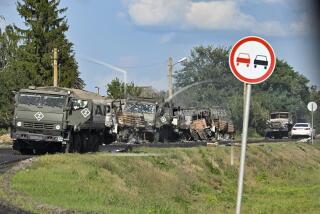Russia and Ukraine mobilize, raising tensions in Crimea
- Share via
MOSCOW -- Russian gunmen on the Crimean peninsula and the embattled new Ukrainian government in Kiev continued to escalate a dangerous confrontation Sunday, with both sides mobilizing armed forces and warning that the other was provoking war.
Hundreds of armed Russians surrounded Kremlin military installations in Crimea, where Moscow leases Soviet-era bases from what is now independent Ukraine. The men, called up from retirement or inactive status with Russia’s Black Sea fleet, sported black-and-orange ribbons celebrating the Soviet victory in World War II or red armbands identifying themselves as “volunteers of the autonomous republic of Crimea.”
The motley reserves joined thousands of professional Russian troops activated by Moscow in Crimea over the past three days in a defiant challenge to the interim government that has taken power in Kiev, the Ukrainian capital, since deposed ex-President Viktor Yanukovich fled on Feb. 21 and took refuge in Russia.
Crimean government leader Sergei Aksenov, installed Thursday during a parliamentary session in Simferopol held while the building was occupied by masked Russian gunmen, reiterated Sunday that he was in command of all security and military forces in Crimea and was determined to protect the Russian population and military installations from “radicals” and “bandits” sent from Kiev.
In a broadcast carried by Rossiya-24 television, Aksenov reminded Russian forces deployed in Crimea of their “responsibility to defend and protect Russian people and interests.”
Hundreds of the mobilized civilians and Russian troops surrounded a military base in Privolnoye, spurring outcries in Kiev and western Ukraine that Moscow was trying to provoke war.
There were no reports of armed confrontation, but Western leaders alarmed by the standoff have warned that the atmosphere of hostility and mistrust could spark bloodshed, whether intended by either side or not.
In Kiev, acting Prime Minister Arseny Yatsenyuk called the Russian troop movements and call to arms of Crimea’s predominantly ethnic Russian population “a declaration of war.”
After a closed session of parliament, Yatsenyuk said Ukraine was “on the brink of national disaster” and urged Putin to pull back Russian forces to their bases, saying the Kremlin chief surely didn’t want to be “the president who starts war between two friendly and neighboring countries,” but was inches away from doing so.
Ukrainian reservists were also activated Sunday to bolster regular armed forces that even Kiev’s interim defense minister, Ihor Tenyuh, has conceded are outnumbered and outflanked by Russia’s forces, which were given a green light by the upper house of the Russian parliament Saturday to deploy to Ukraine if President Vladimir Putin judges that Russian citizens or military assets are threatened.
In Moscow, the Russian government attempted to project an image of normalcy while tensions at the southern fringes of the former Soviet empire reached fever pitch.
State-run television showed video from a ceremony near Red Square to welcome back the Olympic flame and its bearers after the 16-day winter games in Sochi last month.
At Pushkin Square, less than a mile from the Kremlin, thousands gathered to watch a parade celebrating the culmination of Maslenitsa, a weeklong, pre-Lenten Orthodox festival.
Still, a nervous pall covered the capital’s sporting and religious observance. Militia vehicles sealed off roads leading to the Maslenitsa parade route and a bank of metal detectors was erected to screen marchers.
A few blocks away, outside the Ukrainian embassy in Moscow, dozens of police huddled in two buses stationed at the gated diplomatic compound laid with floral tributes to those killed at Kiev’s Independence Square in the deadly climax of a three-month rebellion against Yanukovich. There were no demonstrators, either for or against the Kiev leadership. A lone Russian protester appeared there occasionally last week, wearing a sandwich board declaring “No to fascism in Ukraine.”
Russian media reported that Putin and U.N. Secretary General Ban Ki-moon spoke by telephone early Sunday but gave few details other than that the Russian president reiterated that “in the case of escalation of violent actions in relation to the Russian population living in the eastern regions of Ukraine and in Crimea, Russia cannot stand aside and will take the necessary measures within the framework of international law,” according to a report on the Kremlin news site.
French President Francois Hollande also spoke with Putin and was given the same message, another post on the website reported.
Twitter: @cjwilliamslat
More to Read
Sign up for Essential California
The most important California stories and recommendations in your inbox every morning.
You may occasionally receive promotional content from the Los Angeles Times.














